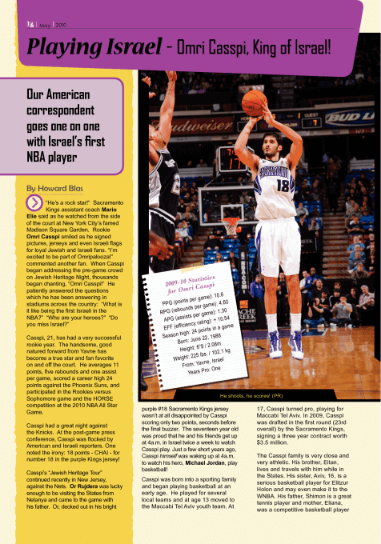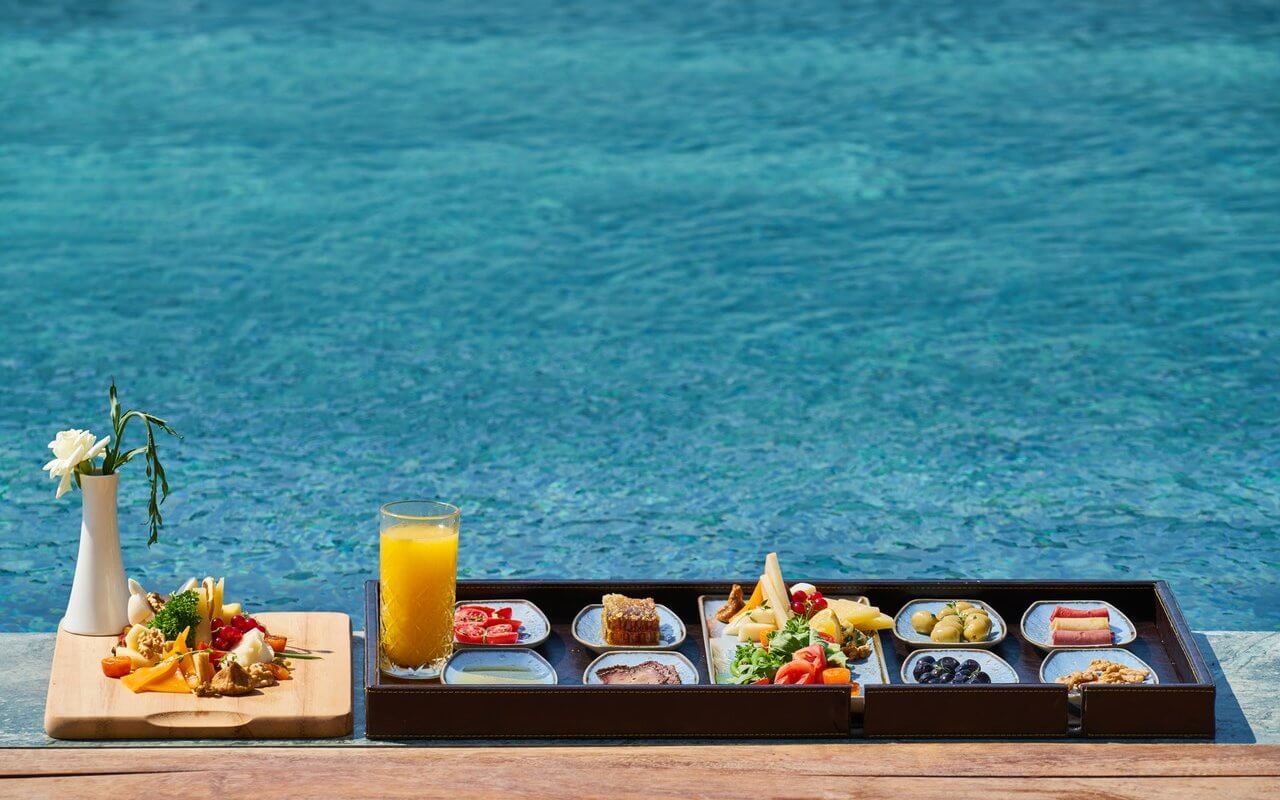Original Article published on The Jerusalem Post
Our American correspondent goes one on one with Israel’s first NBA player
He is a rock star! Sacramento Kings assistant coach Mario Elie said as he watched from the side of the court at New York City famed Madison Square Garden. Rookie Omri Casspi smiled as he signed pictures, jerseys and even Israeli flags for loyal Jewish and Israeli fans. I’m excited to be part of Omripalooza! commented another fan. When Casspi began addressing the pre-game crowd on Jewish Heritage Night, thousands began chanting, Omri Casspi! He patiently answered the questions which he has been answering in stadiums across the country: What is it like being the first Israeli in the NBA? Who are your heroes? Do you miss Israel?.

Casspi, 21, has had a very successful rookie year. The handsome, good natured forward from Yavne has become a true star and fan favorite on and off the court. He averages 11 points, five rebounds and one assist per game, scored a career high 24 points against the Phoenix Suns, and participated in the Rookies versus Sophomore game and the HORSE competition at the 2010 NBA All Star Game.
Casspi had a great night against the Knicks. At the post-game press conference, Casspi was flocked by American and Israeli reporters. One noted the irony: 18 points – CHAI – for number 18 in the purple Kings jersey!
Casspi’s Jewish Heritage Tour continued recently in New Jersey, against the Nets. Or Rujdera was lucky enough to be visiting the States from Netanya and came to the game with his father. Or, decked out in his bright purple #18 Sacramento Kings jersey wasn’t at all disappointed by Casspi scoring only two points, seconds before the final buzzer. The seventeen year old was proud that he and his friends get up at 4am in Israel twice a week to watch Casspi play. Just a few short years ago, Casspi himself was waking up at 4am to watch his hero, Michael Jordan, play basketball!
Casspi was born into a sporting family and began playing basketball at an early age. He played for several local teams and at age 13 moved to the Maccabi Tel Aviv youth team. At 17, Casspi turned pro, playing for Maccabi Tel Aviv. In 2009, Casspi was drafted in the first round (23rd overall) by the Sacramento Kings, signing a three year contract worth $3.5 million.
The Casspi family is very close and very athletic. His brother, Eitan, lives and travels with him while in the States. His sister, Aviv, 16, is a serious basketball player for Elitzur Holon and may even make it to the WNBA. His father, Shimon is a great tennis player and mother, Eliana, was a competitive basketball player herself. They take turns coming to the States to watch Omri play!
Casspi understands what it means to represent Israel and the Jewish People. I feel great pride being Jewish and Israeli, and a lot of responsibility. I feel happy being Israeli and Jewish every time I step on the court. At the end of the season, he will return to Israel and play for Israel’s National Team.
Casspi is truly blessed; he is a talented athlete surrounded by supportive family, teammates and fans. And he is a true mentsch! We have high hopes for Casspi as he continues to be Israel’s ambassador around the world.

Do you miss Israel?
I miss home. My family and friends are there. But I have gotten used to living in the States; it is pretty comfortable now.
Do you ever feel affected by the current political situation between the US and Israel?
I’m reading and trying to be as connected as possible. However, I’m mostly focusing on basketball.
What is your current relationship with Maccabi Electra?
They are my friends and it was my home for over 8 years.
Tell us about your sister, Aviv, and her hopes for the WNBA.
She is 16 and plays for Elitzur Holon. She is very talented. We pray for her. You never know!
Who are your mentors at the Kings?
Francisco Garcia (#32, a guard) has really shown me the ropes.
What has been the biggest adjustment playing in the NBA?
Getting used to the athleticism, physicality and nightly games.
You have worn lots of different numbers so far. Now you are wearing #18…
I wear #18 because it is symbolic to our Jewish community. It means life. I plan to wear it from now on!
Tell us about your army service.
Army service is an important part of growing up in Israel. I did it, my brother did it, my father all my friends. I was a sports counselor for three years. I taught, refereed and played. The army really helped me. It was a good experience.
What does it mean to you to be the first Israeli in the NBA?
It is a great honor. I am trying to be the best player and the best example I can be.
Favorite Jewish holiday?
Chanukah. I love sufganiyot!
Did you celebrate your bar mitzvah?
Yes, at home in Israel. I went to my local synagogue on Shabbat, read Torah, everything. We took a family trip to the States, which is when the Nike Commercial was filmed.
Other sports you love?
Soccer and tennis.
Favorite food other than hummus?
Italian pasta, chicken, pizza.
Shoe size?
13. At games I usually wear black Nike’s with a white swoosh.
Favorite movie?
Currently Avatar. In general, Lord of the Rings.
Favorite music?
I love Israeli music Shlomo Artzi, Eyal Golan, Muki.
How did you spend Yom Haatzmaut?
I was at home in Israel with my family and friends having a barbecue!



